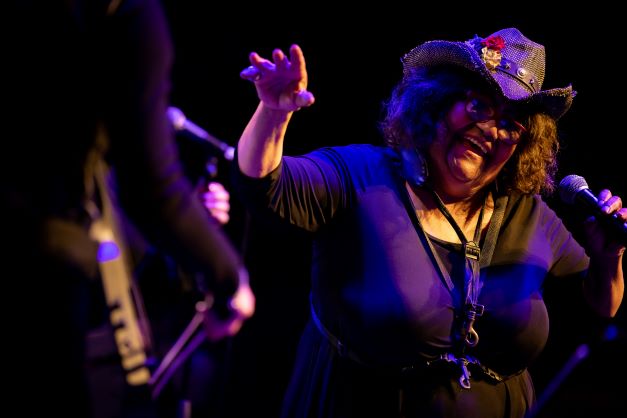C5 Marloo’s Blues

-
Sunday, 30 Apr 2023
-
Fairfax Theatre
National Gallery of Australia
-
In Association with

-
With Support From


In association with SIMA, with support from the Australia Council for the Arts
“The life Marlene has lived is closer to the life of original blues singers like Muddy Waters than any contemporary American blues artist” Richard Field, Producer
Your chance to hear one of Australia’s most authentic blues singers in action. Marlene Cummins aka ‘Marloo’ is a saxophonist, activist and proud Guguyelandji, and Woppaburra woman. Growing up under the cloud of the Aboriginal Protection Act of the 1950s and 60s, Marlene had a grassroots upbringing in a very politically aware family. Marlene refined her skills as a blues saxophonist and songwriter at the Berklee College of Music Boston in the mid-90s and has been performing live for as long as she can remember.
Also an actor and storyteller, Marlene released her first full-length album, Koori Woman Blues to coincide with the premiere of her biographical documentary film ‘Black Panther Woman’ co-written with Rachel Perkins. More recently, Marlene played the role of Beenie in Nardi Simpson’s play ‘Black Drop Effect’ which premiered at the Sydney Festival in January 2020.
Considered one of Australia’s foremost Indigenous blues writers and performers, Marlene knows the blues from an Aboriginal woman’s perspective. In the tradition of legendary blues women Big Mama Thornton and Bessie Smith, her story is one of vulnerability, strength and, ultimately, survival.
Artists
Marlene Cummins, saxophone and vocals
Lauren White, bass
Noel Elmowy, keyboard
Calvin Welch, drums
Ji Eun You, cello
Rex Goh, guitar and musical director
Carmel Mesiti, backing vocals
with William Barton, didgeridoo
This concert is supported by Pamela and Allan O’Neil
ARTIST Learn more about the artist
Artist Marlene Cummins
Musician / Artist / Actor / Broadcaster / Story Teller
A Proud Guguyelandji and Woppaburra Woman
Born in the southwest Queensland town of Cunnamulla, Marlene’s traditional people on her Father’s side are Guguyelandji, and Woppaburra on her Mother’s side. The family then moved to Winton where Marlene spent her formative years. Growing up under the cloud of the Aboriginal Protection Act of the 1950s and 60s, Marlene had a ‘grassroots’ upbringing in a very politically aware family.
Marlene’s life is the story of her people and she tells it through her art, her lyrics, her on-stage performance as both an actress and singer and more recently through documentary film making. Marlene refined her skills as a blues saxophonist and songwriter at the Berklee College of Music Boston in the mid-90s and has been performing live for as long as she can remember.
Marlene presents a biographical journey through her music; a myriad of political, social and personal experiences that content her lyrics and songs. With a mixture of original and traditional blues numbers, the centrepiece and original song is the stirring epic blues anthem, ‘Koori Woman’. Marlene dedicates this song to Aboriginal women everywhere as they were, in her words, ‘the backbone of the struggle’.